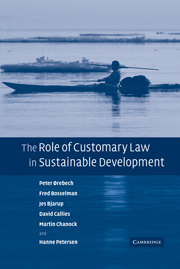Book contents
- Frontmatter
- Contents
- Preface
- Acknowledgements
- Table of cases
- List of international conventions
- Introduction
- 1 The linkage between sustainable development and customary law
- 2 Three case studies from Hawaii, Norway and Greenland
- 3 Social interaction: the foundation of customary law
- 4 How custom becomes law in England
- 5 How custom becomes law in Norway
- 6 Adaptive resource management through customary law
- 7 The place of customary law in democratic societies
- 8 Customary law, sustainable development and the failing state
- 9 Towards sustainability: the basis in international law
- 10 The case studies revisited
- 11 The choice of customary law
- 12 Conclusion: customary law in a globalizing culture
- References
- Index
- Authors index
11 - The choice of customary law
Published online by Cambridge University Press: 18 December 2009
- Frontmatter
- Contents
- Preface
- Acknowledgements
- Table of cases
- List of international conventions
- Introduction
- 1 The linkage between sustainable development and customary law
- 2 Three case studies from Hawaii, Norway and Greenland
- 3 Social interaction: the foundation of customary law
- 4 How custom becomes law in England
- 5 How custom becomes law in Norway
- 6 Adaptive resource management through customary law
- 7 The place of customary law in democratic societies
- 8 Customary law, sustainable development and the failing state
- 9 Towards sustainability: the basis in international law
- 10 The case studies revisited
- 11 The choice of customary law
- 12 Conclusion: customary law in a globalizing culture
- References
- Index
- Authors index
Summary
People choose to use customary law for a wide variety of reasons. Some choose to maximize ethnic identity, some local solidarity, and some adaptation to modern conditions. Customary law provides an important element in all of these situations, whether as a symbol to be treasured, an ideal to be regained, or a tradition to be honored in the adaptation. To blindly assume that customary law will produce sustainable development is naïve. Michael Soulé suggests that the myth of moral superiority of non-western traditions “has led guilt-ridden Westerners to glorify the environmental ethics of non-western traditions … Some indigenous people can provide excellent guidance, some not.”
Customary law in its original form may be a vulnerable instrument wholly dependent upon popular recognition, but it is also a valuable source that should be studied in the never-ending search for ways to accommodate to an environment that has been and will remain constantly changing. The growing volume of case studies of customary systems is evidence of a growing recognition that such systems may be a source of wise resource policies.
Reasons to choose customary law
Why might policy-makers choose to implement customary law systems? A review of the literature suggests that the following are some of the arguments most commonly heard in favor of customary law systems.
Empowerment
Giving a group's customs legal stature may reinforce a group's sense of responsibility that comes with law-making power. Resource user groups themselves often see their traditional customs as a source of potential power for their group.
- Type
- Chapter
- Information
- The Role of Customary Law in Sustainable Development , pp. 435 - 444Publisher: Cambridge University PressPrint publication year: 2006

